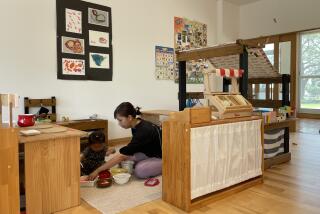Leash Tightening on Japan’s Salarymen
- Share via
TOKYO — Hiroyuki Kojima used to play golf on weekends, take lots of taxis and hit the bars after work to unwind with drinks and friends. Now he eats cheap lunches of rice and beef strips.
After work, he just goes home.
Like many Japanese fathers, Kojima lives on an allowance set by his wife. And with the way business has been going for “Japan Inc.” these days, they are finding themselves on a very short leash.
“It’s the worst,” said Kojima, a 40-year-old print shop worker in Tokyo and father of two.
While politicians and fiscal planners worry about rescuing Japan from its worst economic downturn in decades, the dwindling allowances of Japan’s working fathers have become something of a national debate lately.
It was started by an article in Asahi, a major newspaper, on how office workers are coping with the tight economy.
The article hit a sore nerve, inspiring similar reports on television and generating more than 100 faxes and e-mails from readers. That led the newspaper to follow up by interviewing penny-pinching fathers.
One father featured in the article was “Kenji,” 44, who told the paper he tries to save by keeping his lunch down to a mere 250 yen, or about $2. That’s usually not enough to include a drink, so one day after buying a 65-yen (55-cent) hamburger at McDonald’s, he asked for a glass of water. He was refused.
“It just didn’t seem right,” he was quoted as saying.
According to the Labor Ministry, the average salary in Japan has been declining since 1997, and unemployment is at a near record high of almost 5%.
The situation is particularly tough on working fathers.
Most parents don’t seem to want their children to suffer. A Tokyo FM station found the allowances for high school kids are increasing, from the equivalent of about $85 a month in 1997 to $110 last year.
Meanwhile, dad’s pocket money is down, according to a survey by GE Consumer Credit Corp. Last year it averaged $510 a month, far below the 1990 average of $640.
So in Tokyo about $20 a day has to cover lunch, clothes, hobbies, cigarettes and socializing--in a city where a shot of whiskey costs around $6 and cab fare starts at $5.60.
“Every day I wish it would be more,” Manabu Ono, a 35-year-old salesman, said of his even smaller than average $320 allowance.
The company tab for entertaining colleagues and customers, seemingly bottomless during the boom years of the late 1980s, has been slashed.
To make things even more delicate, despite Japan’s male-oriented culture, divvying up a household’s income is traditionally the wife’s responsibility.
Almost 70% of more than 1,100 married women under 40 polled by the Institute of Household Economy said their husbands hand over their entire salary each month.
Mariko Sakuma, a 29-year-old housewife who recently had her first child, said she will soon be asking her husband to give back $85 from his monthly allowance.
“Sometimes, though, I look into his wallet and if he only has 1,000 yen [$8.50], I put in some money for him,” she said.
One result of the cuts is that cheap restaurants and noodle stands in Tokyo are often crowded with businessmen who might have previously lunched in pricier haunts.
There may be a silver lining to the current trend, however: Unable to go out on the town, working fathers are spending more time with their families.
“With big companies going bankrupt or restructuring, Japan’s corporate society is collapsing,” said Shoichi Nishikawa, an editor at Asahi. “Fathers have no place to go but home.”
More to Read
Inside the business of entertainment
The Wide Shot brings you news, analysis and insights on everything from streaming wars to production — and what it all means for the future.
You may occasionally receive promotional content from the Los Angeles Times.










